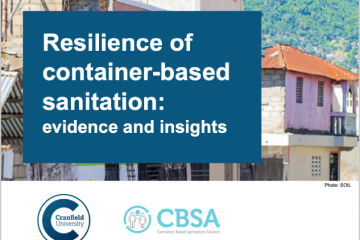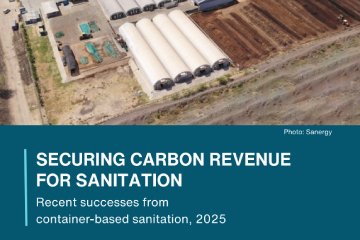CBSA and its members featured prominently throughout this conference where we had numerous interesting and thought-provoking discussions. These three key issues gave us pause for thought:
We need to respect sanitation aspirations – and work to shift them
For those of us working in non-sewered sanitation, it’s easy to get excited about the many benefits and possibilities these approaches offer, including cost savings, reduced climate impact, and reuse potential. But we must remember that solutions like CBS are often seen as a temporary solution, a crucial public health intervention but part of the journey to universal coverage. Even where people are satisfied with non-sewered services, flush toilets are still widely seen as the most desirable form of sanitation, which influences the way governments plan and think about sanitation provision. We need to understand and respect that. However, with increasing water scarcity and climate pressures, it is also true that sewers aren’t currently the most sustainable solution. To ensure a more equitable and environmentally conscious future, we also need to shift the perception of other solutions as second-rate. Key to this will be the widespread adoption of non-sewered sanitation by higher-income groups and countries.
There is no ideal sanitation for areas urgently requiring settlement upgrading but transitional solutions are needed now
When trying to provide access to sanitation in informal areas, we are faced with a multitude of challenges, such as space restrictions, lack of water, uninhabitable land and tenure issues, all of which require design innovation and compromise. In these areas, people live in unsafe and insecure dwellings and face a wider struggle to secure their right to adequate housing of which sanitation is just an element, albeit a major one. We must remember and acknowledge the unacceptability of these conditions and support settlement upgrading initiatives including improved sanitation services. However, with a billion people living in informal areas globally, transitional solutions are needed in the meantime and non-sewered solutions like CBS can play a critical transitional role thanks to their feasibility in many of the most challenging contexts.
There is a willingness to pay for sanitation, even amongst low-income households, but we can’t rely on residents to cover the full cost of service
The conference celebrated CBSA member Loowatt’s success in reaching 100 households with its paid services in Durban in South Africa, which is particularly interesting due to the high expectation of free sanitation provision in the country. Key to this success has been strong community relations and ensuring clean, quality and dignified services. This demonstrates that even low-income households are willing to pay for sanitation services, supporting private-sector approaches. At CBSA, we believe that the private sector can play a valuable role in reducing the funding gap through efficient, customer-focused services and diversified revenue streams including affordable user fees. However, we also know that, to be affordable, user fees will not cover the costs of safely managed sanitation and the sector needs to recognise that if we want to serve low-income communities AND provide a full chain service, public subsidies will be required for non-sewered sanitation – just as they are for networked services.


